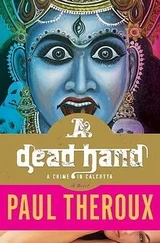pretty patent leather shoes and mauve stockings, the latter being of the
same colour as her dress. "If I had not my neuralgia!" she added,
putting her fingers to her temple. "You will make all my excuses to
them. Come, my poor Alfred, courage!"
She rose and held out her hand to her husband, who drew her to him in
order to give her a kiss. Visible pain was depicted on Helen's handsome
face for a minute, during which she was constrained to submit to this
caress. Standing thus, in her mauve-coloured, lace-trimmed dress, the
contrast between the elegance of her entire person and the clumsiness of
the man whose name she bore was still more striking.
She was tall, slender, and supple. The delicacy with which her hand
joined the arm which the sleeve of her dress left half uncovered, the
fulness of this arm, on which shone the gold of a bracelet, the
roundness of her dainty waist, the grace of her youthful figure,--all
revealed in her the blooming of a bodily beauty in harmony with the
beauty of her head. Her bright chestnut hair, parted simply in the
centre, half concealed a forehead that was almost too high--a probable
sign that with her feeling predominated over judgment. She had brown
eyes, in a fair complexion, such eyes as become hazel or black according
as the pupil contracts or dilates; and everything in the face declared
passion, energy, and pride, from the rather too pronounced line of the
oval, indicating the firm structure of the lower part of the head, to
the mouth, which was strongly outlined, and from the chin, which was
worthy of an ancient medal, to the nose, which was nearly straight, and
was united to the forehead by a noble attachment.
The pure and living quality of her beauty fully justified the fervour
depicted on the face of her husband while he was kissing his wife, just
as the evident aversion of the young woman was explained by the
unpleasing aspect of her lord and master. They were not creatures of the
same breed. Alfred Chazel presented the regular type of a middle-class
Frenchman, who has had to work too diligently, to prepare for too many
examinations, to spend too many hours over papers or before a desk, at
an age when the body is developing.
Although he was scarcely thirty-two, the first tokens of physical wear
and tear were abundant with him. His hair was thin, his complexion
looked impoverished, his shoulders were both broad and bony, and there
was an angularity in his gestures as well as an awkwardness about his
entire person. His tall figure, his big bones, and his large hand
suggested a disparity between the initial constitution, which must have
been robust, and the education, which must have been reducing. Chazel
carried an eye-glass, which he was always letting fall, for he was
clumsy with his long, thin hands, as was attested by the tying of the
white evening cravat, so badly adjusted round his already crumpled
collar. But when the eye-glass fell, the blue colour of his eyes was the
better seen--a blue so open, so fresh, so childlike, that the most
ill-disposed persons would have found it hard to attribute this man's
weariness to any excess save that of thought.
His still very youthful smile, displaying white teeth beneath a fair
beard, which Alfred wore in its entirety, harmonised with this childlike
frankness of look. And, in fact, Chazel's life had been passed in
continuous, absorbing work, and in an absolute inexperience of what was
not "his business," as he used to say. Son of a modest professor of
chemistry, and grandson of a peasant, Alfred, having inherited aptitude
for the sciences from his father, and tenacity of purpose from his
grandfather, had, by dint of energy, and with but moderate abilities,
been one of the first at the entrance to that École Polytechnique
which, in the estimation of many excellent intellects, exercises, by its
overloaded and precocious examinations, a murderous influence upon the
development of the middle-class youth of our country.
At twenty-two, Chazel passed out twelfth, and three years later first
from the School of Roads and Bridges. Sent to Bourges, he fell in love
with Mademoiselle de Vaivre, whose father, having married a second time,
could give her only a very slender dowry. The unexpected death, first of
Monsieur de Vaivre, then of his second wife and of their child, suddenly
enriched the young household. Appointed the preceding year to a
municipal post at Paris, the engineer found that he had realised a
hundredfold the most ambitious hopes of his youth. His wife's fortune
amounted to about nine hundred thousand francs, to the returns from
which were added the ten thousand francs of his own salary and the small
income which had been left by his father. But this competency, instead
of blunting the young man's activity, stimulated it to the ambition of
compensating in honour for the inequality of position between himself
and his wife. He had, accordingly, gone back to mathematical labours
with fresh ardour. Admission to the Institute shone on the horizon of
his dreams, like a sort of final apotheosis to a destiny, the happiness
of which he modestly referred to his father's wise maxim: "To keep to
the high road."
Add to this that a son had been born to him, in whom he already
discerned a reflection of his own disposition, and it cannot fail to be
understood how this man would congratulate himself daily for having
taken life, as he had done, with complete submission to all the average
conditions of the social class in which he had been born.
Did these various reflections pass through the mind of the third
individual--the man whom Alfred Chazel had called Armand, as he
contemplated the conjugal tableau through the smoke from a Russian
cigarette which he had just lighted--a liberty which revealed the extent
of his intimacy with the family? The same contrast which separated
Alfred from Helen separated him also from Armand. The latter looked at
first younger than his age, though he too had passed his thirty-second
year. If Alfred's carelessly-worn coat revealed rather the leanness and
disproportion of his body, the frock of the Baron de Querne--such was
Armand's family-name--fitted close to the shoulders and bust of a man,
small but robust, and evidently devoted to fencing, riding, tennis, and
all the sporting habits which the youths of the richer classes have
contracted in imitation of the English, now that political
careers--diplomacy, the Council of State, and the Audit Office--are
denied them by their real or assumed opinions.
The quiet jewellery with which the young baron was adorned, the delicacy
of his hands and feet, and everything in his appearance, from his cravat
and his collar to the curls in his dark hair, and to the turn of his
moustache, drawn out over a somewhat contemptuous lip, disclosed that
deep attention to the toilet which assumes the lengthened leisure of an
idle life. But what preserved De Querne from the commonplaceness usual
to men who are visibly occupied with the trifles of masculine fashion
was a look, in a generally immovable face, of peculiar keenness and
unrest. This look, which was not at all like that of a young man,
contradicted the remainder of his person to the extent of imparting an
appearance of strangeness to one who looked in this way, although a
desire to evade remark, and to be above all things correct, evidently
Читать дальше












